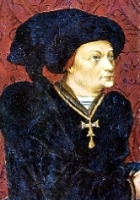Íñigo López de Mendoza
Íñigo López de Mendoza Poems
FROM Calatrava as I took my way
At holy Mary's shrine to kneel and pray,
And sleep upon my eyelids heavy lay,
There where the ground was very rough and wild,
...
Íñigo López de Mendoza Biography
Don Íñigo López de Mendoza y de la Vega, Marquis of Santillana (August 19, 1398 – March 25, 1458) was a Castilian politician and poet who held an important position in society and literature during the reign of John II of Castile. He is an important literary figure of fifteenth-century Spanish poetry and is credited with composing the first Petrarchan style sonnets in Spanish, referred to as the Sonetos fechos al modo (circa 1438-circa 1455), and the first to write formal literary criticism in Castile. In addition to these accomplished firsts, Santillana's allegorical poem, Comedieta de Ponça (1436) marks the first Spanish ars poetica. Although much of Santillana's work enjoyed significant prestige during his lifetime, Santillana is best known today for the composition of his serranillas, many of which can be found in anthologies and histories dealing with Spanish literature. Santillana's work, which is extensive and varied, was significantly influenced by the works of Dante, Petrarch, and Boccaccio, making his body of poetry representative of the transition between medieval and Renaissance Spanish literature. While Santillana's poetry mainly deals with the topics of love, politics, morals, and religion, many critics point out that evidence of Santillana's artistic merit lies in the formality, thematic variety, and extensiveness of his work, all of which demonstrate that he was a dedicated poet. Not only is Santillana considered one of the most enthusiastic and talented Spanish poets of his time, he is also considered a great literary patron. At a time when his country was experiencing political and social unrest, Santillana supported the translations of many Greek and Latin classics into Castilian and used his poetry as a voice of counsel and consolation in an effort to encourage intellectual and cultural progress in his country. Life He was born at Carrión de los Condes in Old Castile to a noble family which figured prominently in the arts. His grandfather, Pedro González de Mendoza I, and his father, Diego Hurtado de Mendoza Admiral of Castile, were both poets with close ties to the great literary figures of the time: Chancellor Lopez de Ayala, Fernán Pérez de Guzmán and Gómez Manrique. His mother, Doña Leonor de la Vega, was a wealthy heiress belonging to the House of de la Vega. Lopez de Mendoza's father died when he was five years old, which brought his family into financial difficulties. Part of his childhood was spent living in his grandmother's household, and in the home of his uncle, the future Archbishop of Toledo. As a youth, he spent time in the court king Alfonso V of Aragón, where he was exposed to the work of poets in the Provençal, Valencia and Catalan traditions, the classic Humanist works of Virgil and Dante Alighieri, and the lyricism of troubadours such as Enrique de Villena. In 1412, Don Íñigo married a wealthy heiress, Catarina Suárez de Figueroa. With this union, he acquired great fortune and became one of the most powerful nobles of his time. His sixth son from the marriage would one day become Cardenal Mendoza. As a politician, Don Íñigo remained loyal to Juan II throughout his life, for which he was richly rewarded with land and the title of Marquis of Santillana in 1445, after the First Battle of Olmedo. When his wife Doña Catarina de Figueroa died, the Marquis retired to his palace of Guadalajara to spend the rest of his life in peaceful study and contemplation. Lopez de Mendoza was a great admirer of Dante Alighieri and his work is categorized within the allegorical-Dantesque School. He also assimilated Petrarch and Giovanni Boccaccio's Humanism. He is especially remembered for his "serranillas", which are small poems that focus on commonplace subjects. He also wrote pastoral novels inspired by French tradition, and was originator of the Castilian Sonnet.)
The Best Poem Of Íñigo López de Mendoza
Serranilla
FROM Calatrava as I took my way
At holy Mary's shrine to kneel and pray,
And sleep upon my eyelids heavy lay,
There where the ground was very rough and wild,
I lost my path and met a peasant child:
From Finojosa, with the herds around her,
There in the fields I found her.
Upon a meadow green with tender grass,
With other rustic cowherds, lad and lass,
So sweet a thing to see I watched her pass:
My eyes could scarce believe her what they found her,
There with the herds around her.
I do not think that roses in the Spring
Are half so lovely in their fashioning:
My heart must needs avow this secret thing,
That had I known her first as then I found her,
From Finojosa, with the herds around her,
I had not strayed so far her face to see
That it might rob me of my liberty.
I questioned her, to know what she might say:
'Has she of Finojosa passed this way? '
She smiled and answered me: 'In vain you sue,
Full well my heart discerns the hope in you:
But she of whom you speak, and have not found her.
Her heart is free, no thought of love has bound her,
Here with the herds around her.'
